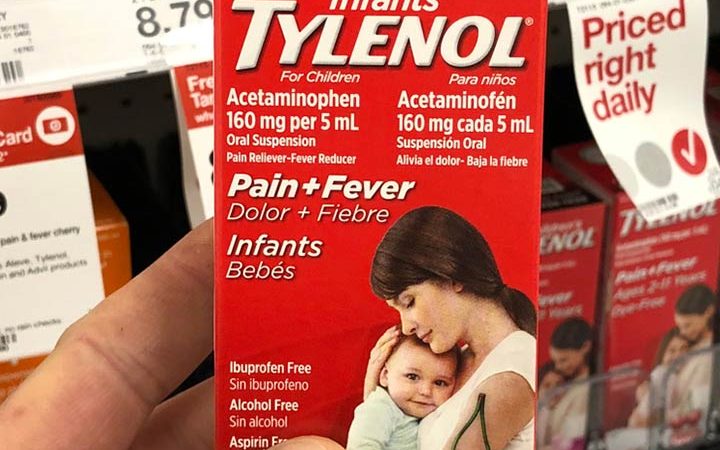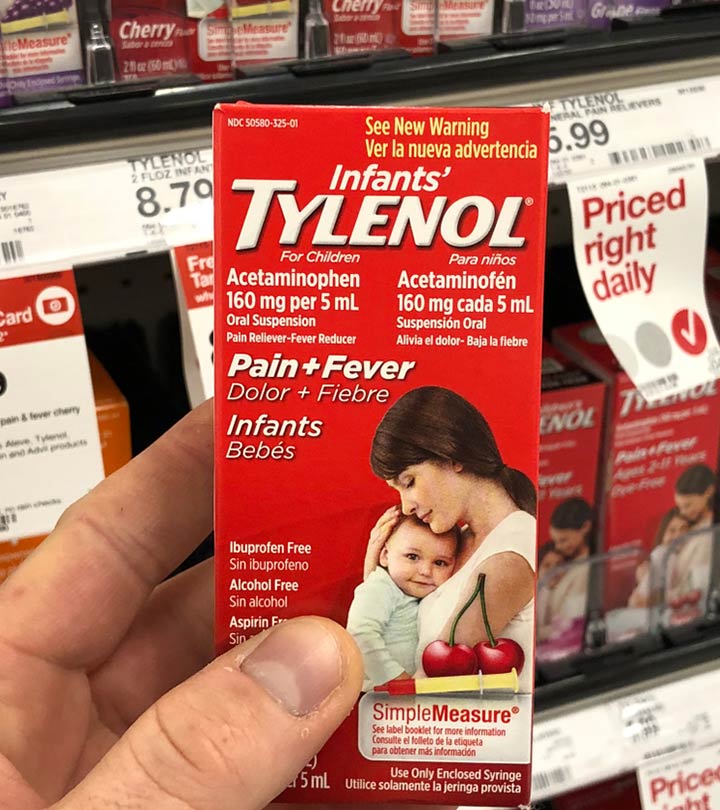Tylenol, containing the major active ingredient acetaminophen, is an over-the-counter oral medication prescribed either as an analgesic (medicines used to relieve pain) or an antipyretic (medicines used to reduce fever). Infants’ Tylenol is a liquid suspension variant of Tylenol specially made for babies and toddlers. The tablet forms could cause choking and should not be given to babies.
It is important to give Tylenol to the baby as per the doctor’s prescription to prevent overdose and its related side effects. Read this post to know about Tylenol dosage instructions for infants, its potential risks, and safe administration techniques.
When To Give Tylenol To A Baby?
The medicine should only be administered when the baby has a fever. According to the American Academy of Pediatrics, fever is considered in babies when their body temperature is more than 100.4°F (38°C) (1).
According to the manufacturer, Infants’ Tylenol oral liquid suspension may also be given to the baby with sore throat, flu, cold, and toothache since the active ingredient acetaminophen also works as a pain reliever (2).
What Is The Infant Dosage Chart For Tylenol?
Experts and the manufacturer of Tylenol recommend that you consult a pediatrician before administering Tylenol to babies or toddlers (3) (4). The dosage could vary depending on your child’s weight. The concentration of acetaminophen in Infants’ Tylenol liquid suspension is at single strength or concentration of 160mg per 5ml.
Below is a table containing the dosage of liquid or syrup form of Tylenol in babies and toddlers as per their weight (5).
| Weight of the child (lbs) | Liquid (ml) |
|---|---|
| 6 – 11 | 1.25 |
| 12 – 17 | 2.5 |
| 18 – 23 | 3.75 |
| 24 – 35 | 5 |
| 36 – 47 | 7.5 |
| 48 – 59 | 10 |
| 60 – 71 | 12.5 |
| 72 – 95 | 15 |
| 96+ | 20 |
Source: American Academy of Pediatrics
You may repeat the administration every four to six hours or as directed by the doctor. You must not administer more than five doses of Tylenol in a day. Do note that your baby’s doctor may prescribe a dosage different than the one mentioned in the table, and you must stick to the doctor’s advice.
How To Safely Administer Tylenol To A Baby?
Below are the steps to administer Infants’ Tylenol liquid to a baby or toddler (2).
- Push the plunger and release the air. Insert the syringe’s tip into the bottle opening.
- Turn the bottle and pull the plunger to the required dosage mark to draw the medicine.
- Gently insert the syringe’s tip into the baby’s mouth, directing the tip towards the baby’s inner cheek.
- Press the plunger gently to release the medicine.
You may use the help of your partner or family member to keep the baby’s head still in case they resist it.
It is essential to keep certain points in mind to ensure the safe administration of Tylenol in babies (4).
- It is vital to use the marked syringe, which ships with a bottle of Infants’ Tylenol, to prevent overdose or other errors related to dosage.
- Keep track of the dosage of the medicine and the time it was administered.
- Always pour out the medicine in a well-lit room to avoid discrepancies in the dosing quantity.
- Follow the instructions provided in the label of the medicine regarding the storage of the medicine.
- If your baby is already on any medication, intimate the doctor about it. A combination of acetaminophen and other drugs may cause severe side effects.
What Are The Risks Of Administering Tylenol?
Tylenol is safe for most babies and seldom causes any side effects when administered as per prescription. In rare cases, a baby could be allergic to acetaminophen, causing skin rashes and blisters.
Overdose of Tylenol leads to overdose of acetaminophen, leading to serious side effects. It usually happens if you do not follow the doctor’s prescription or you are not careful while measuring the quantity of the medicine in the syringe.
Minor overdose may most likely not cause any problems or symptoms. The maximum safe dosage for acetaminophen among children is 90mg per kg of the child’s weight per day (6). A dosage beyond this limit may cause the following signs and symptoms (7).
- Reduction in the frequency and amount of urine
- Respiratory problems such as troubled breathing
Severe overdosing could cause hepatotoxicity and liver damage. The tolerance to overdosing could vary from one baby to another. Therefore, if you realize you accidentally overdosed the baby with Tylenol, call or visit the pediatrician as soon as possible.
When To See A Doctor?
You must see a doctor in the following scenarios (8).
- There has been no improvement in the baby’s symptoms within three days since the administration of Tylenol.
- The symptoms worsen after the administration of Tylenol.
- The baby develops skin rashes or blisters after the administration of Tylenol.
Frequently Asked Questions
- Does Tylenol make babies sleepy?
Tylenol usually does not cause sleepiness in babies when administered in the correct dosage. Some babies in pain or with fever may find relief from symptoms due to Tylenol, causing them to relax and fall asleep. However, overdosing Tylenol/acetaminophen could cause excessive drowsiness and sleepiness as a side effect.
- How long does Tylenol take to work?
Tylenol or liquid-based acetaminophen could take up to 30 minutes to show effects, although this could vary from one baby to another (9).
Tylenol is a commonly available over-the-counter medication brand of acetaminophen. Although it is considered safe for babies and toddlers, you must always get a prescription for it. Administer the right dosage for the optimum effect of acetaminophen on the baby without the risk of overdosing and its associated side effects.
References:
MomJunction’s articles are written after analyzing the research works of expert authors and institutions. Our references consist of resources established by authorities in their respective fields. You can learn more about the authenticity of the information we present in our editorial policy.
The following two tabs change content below.




































